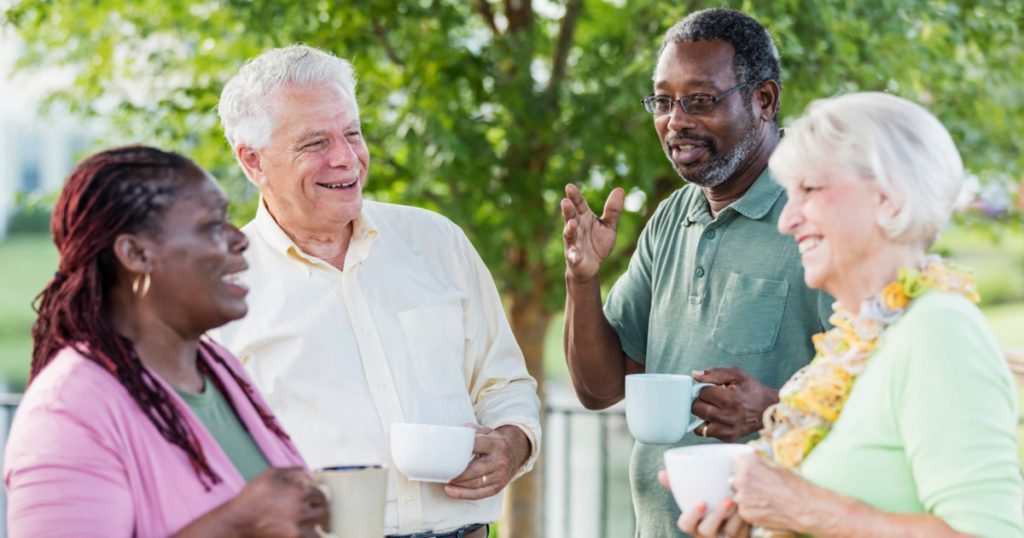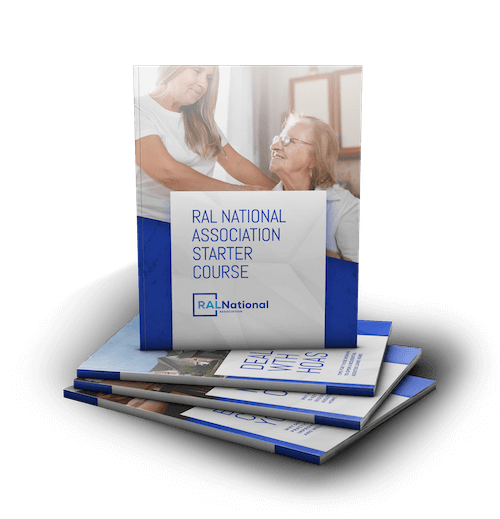Every senior in residential assisted living has a lifetime of stories to share, but sparking these conversations can be tricky.
Have you thought about how conversations with seniors can actually turn into history lessons?
When ignited, these are the most interesting conversations you will ever experience.
When you engage in a conversation with an older person, you may hear decades of experience, knowledge, and memories of their life events.
Having conversations with older people gives you a connection to the past.
The conversations can be enriching, even comforting, and it sometimes has a profound impact on the listener and the senior.
Dialoguing inspires seniors to reminisce more and more.
Reminiscing helps seniors cope with growing older and creates a sense of individual importance and added value.
SIX BENEFITS OF ENCOURAGING SENIORS TO REMINISCE
- Promotes a positive and promising outlook
- Better mental health
- Better physical health
- Greater longevity
- Improves self-esteem
- Reduces depression
Engaging seniors in dialog can trigger a walk down memory lane. Stirring up good memories can create balance and combat loneliness. It gives insight into their past.
STROLL DOWN MEMORY LANE
An imaginary path through the nostalgic and sentimental past can be therapeutic for senior adults.
Asking specific questions gives them a chance to share their most vivid memories.
Ask Questions About Their Childhood
- What are your greatest memories of the place you were born?
- The place they grew up in.
- What was their first job?
- What was the name of their first childhood crush?
These are just a few conversation starters to engage senior adults who will feel happy and vibrant.
Memory has a way of holding on to the things you love, the things you are, the things you never want to lose.
MEMORIES ABOUT FAMILY SPARKS THE BEST CONVERSATIONS
Older people love to reflect on their memories of family. Those memories provide lots of smiles and laughter for them.
Laughter is the best medicine, and it lightens the day. Some family memories bring about sadness.
Many seniors are reluctant to talk about themselves but will find joy talking about people in their families.
Asking about experiences, significant milestones, and world events such as:
- Talking about their parents
- Meeting their spouse?
- Their most memorable trip you took.
- Their most memorable holidays.
Sharing their past helps increase their communication skills which improves brain health. Talking about their history can also reduce stress levels.
It allows them the opportunity to deal with any emotions they may have. Going through old photos and reliving holiday traditions are also emotional moments for seniors.
Many seniors are the matriarch of the family, and their memories are valuable for future generations.
MAKE SMALL TALK WITH SENIORS IN ASSISTED LIVING
Talking to senior adults on a day-to-day basis allows you to determine how they are doing health-wise and their state of mind.
Small talk fosters communication and interaction.
It is good to find out what is going on in the lives of people living in your assisted living home. Learn about their habits and daily routines. Here are a few minor talking points:
- How are you feeling?
- When was the last time you saw your doctor?
- What are the doctors saying about your health?
- Do you have any personal interests?
- What does your typical day involve?
- Are there any events that create excitement for your future?
- Has anything changed in your life?
These types of conversations are essential for senior adults. Be vigilant about their well-being because it is essential for their overall health.
Knowing that seniors in assisted living are mixing socially with others is the best way to put residents on a path to good health.
LEAVING YOUR MARK
Seniors have a plethora of knowledge and wisdom. Overall, many seniors can leave a legacy based on their life experiences.
Some seniors are open and honest about their perspective on life and growing older. Then some seniors avoid heavy topics because of the sadness attached.
Have you thought about the mark that seniors can leave on you? Here are some ways to bring up their legacy and mark:
- How would you tell your story?
- How would your account be written?
- What are some of the most influential moments in your life?
- What is your advice for leading a good life?
- What is your philosophy on life?
- What has been the best thing about getting older?
Living is not just about being here, it’s about leaving the world a better place because I was here.
TALKING TO SENIORS WITH DEMENTIA
For seniors living with dementia, things once remembered about the past, now make no sense. Conversations once enjoyed, spark no interest.
Caregivers and family members try to have a positive conversation, but it ends up being a challenge.
Dementia is a brain disease that causes memory disorders and impaired reasoning. It can leave you wondering how to engage in a conversation.
These specific and positive communication techniques can help:
- Breathing:
Take a few deep breaths, stay positive, smile, and remain still throughout the conversation. - Pick a Topic:
Bring conversations that will appeal to that person, their area of interest. Avoid irritating and angering issues. - Get Close:
Avoid talking down to them. Sit close to senior residents during conversations. - Listen:
Avoid asking questions or correcting them. It could be confusing. Use your listening skill instead. - Pay Attention:
Keeping them focused is paying attention to what they are saying. Give eye contact and show that you are engaged.
“Conversation is a meeting of minds with different memories and habits. When minds meet, they don’t just exchange facts: they transform them, reshape them, draw different implications from them, engage in new trains of thought. The conversation doesn’t just reshuffle the cards: it creates new cards,” said Theodore Zeldin.
Many seniors who are still active want to feel helpful even with limited functions. Engaging them can make them feel wanted and needed.
Residential Assisted Living National Association can help you find ways to engage seniors in your residential assisted living home.
Get connected with a free membership to remove any barriers or obstacles seniors are experiencing that prevent quality care.
Membership with RALNA provides free newsletters, informational blogs, discount group purchasing, and legal support.
Click here, www.RALNA.com to enroll for your free membership today.











